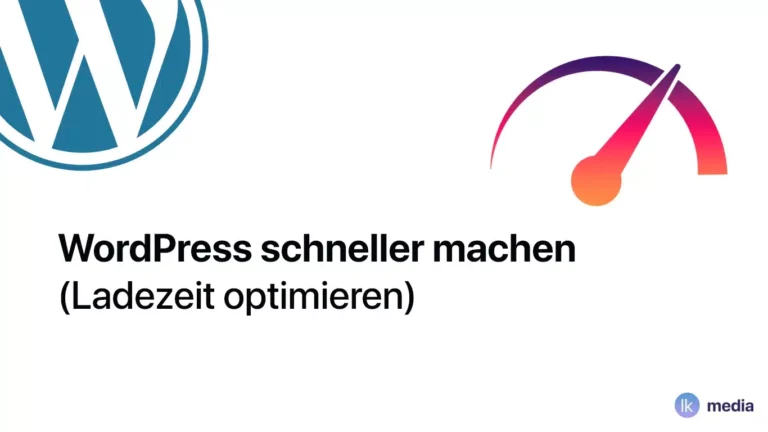In this guide I explain how to speed up your WordPress site (speed optimization).
A fast loading time not only improves the user experience, but also significantly influences the visibility of your website in search engines. Google and other search engines prefer websites that load quickly, meaning that the speed of your WordPress website directly affects your SEO rankings and therefore your online presence.
This is why a short loading time is important: Who likes to wait? Correct: No one. A short loading time is therefore also important for website visitors, because if something takes a long time to load, it is annoying. A visitor is happy when he gets the content he is looking for - and quickly. Slow loading websites therefore lose importance.
Many factors contribute to website performance, from the quality of your web hosting to the size of your images. Fortunately, WordPress, as one of the most versatile and customizable platforms, offers numerous ways to optimize and speed up your website. This guide will walk you through the key steps to improve WordPress website speed.
Important: Optimizing the speed of your WordPress website is an ongoing process that requires regular checks and adjustments, but by implementing the best practices outlined in this article, you can achieve significant improvement in loading times.
Causes of slow WordPress websites
The speed of your WordPress website can be affected by a variety of factors. A deep understanding of these factors is the first step to optimizing your website for better loading times. Here are the most common causes of a slow WordPress website:
Overloaded plugins
Plugins expand the functionality of your WordPress website, but if they are of poor quality or overused, they can significantly impact its speed. Each additional plugin adds more scripts, stylesheets, and possibly database queries to the website, which can increase loading time. It is important to use only necessary plugins and to regularly check whether each plugin is actually needed.
Important: More than 30 plugins are usually not necessary and lead to a slow site.
Images in too high a resolution
Images are an essential part of any website, but if not optimized correctly, they can lead to slow loading times. High-resolution images uploaded directly without first being compressed can significantly increase loading time. Optimizing images by reducing their size without compromising quality is an important step in speeding up your website.
Inefficient web hosting
The choice of web hosting provider has a significant impact on the speed of your website. Cheap hosting may be attractive, but these providers may have overcrowded servers that result in slow loading times. A high-quality hosting service that is specifically optimized for WordPress can make a significant difference in the performance of your website.
Unoptimized database
Over time, your WordPress database can become bloated with deleted plugins, post revisions, and other leftovers. An unoptimized database can affect your site's speed because it takes longer to retrieve information. Regular database maintenance and optimization is crucial for a fast site.
Outdated WordPress versions
WordPress is regularly updated to add new features and improve security and performance. Running your website on an outdated version of WordPress can lead to compatibility issues and slow loading times. It's important to keep your WordPress installation, themes and plugins up to date.
Identifying and fixing these common problems can make a significant difference in WordPress website performance.
Measure 1: Use a cache plugin
WordPress is a dynamic system. This means: Every time a visitor comes to your website, WordPress has to build the website first. However, you can prevent this with a cache plugin. I wrote a post about which plugins are recommended (and which are not):
I am currently using FlyingPress (costs $42). I can also recommend WP Rocket or WP Fastest Cache.
My settings look like this:
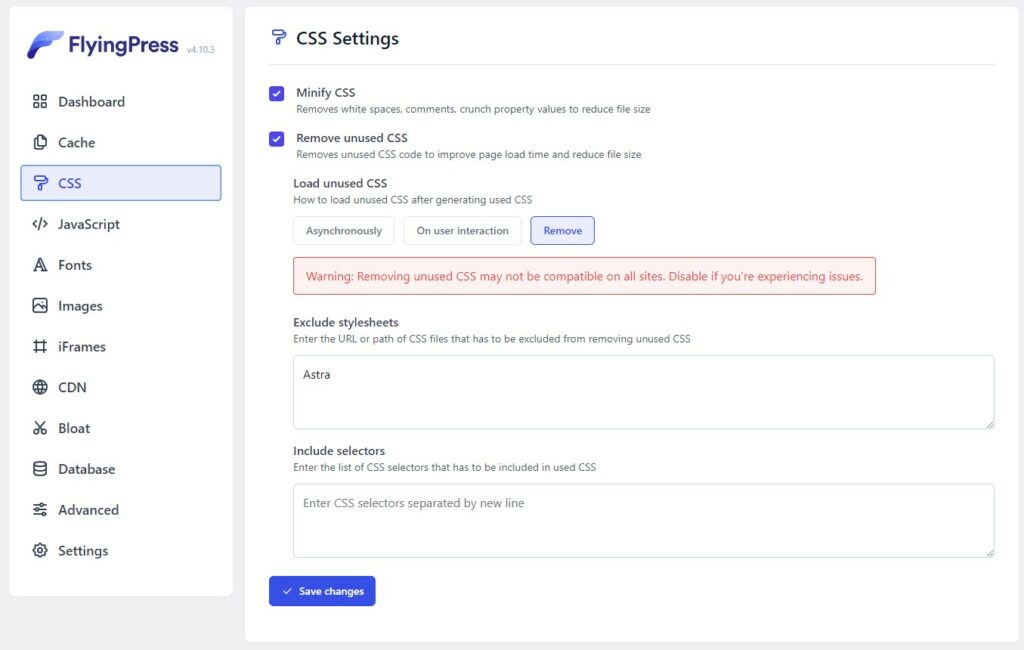
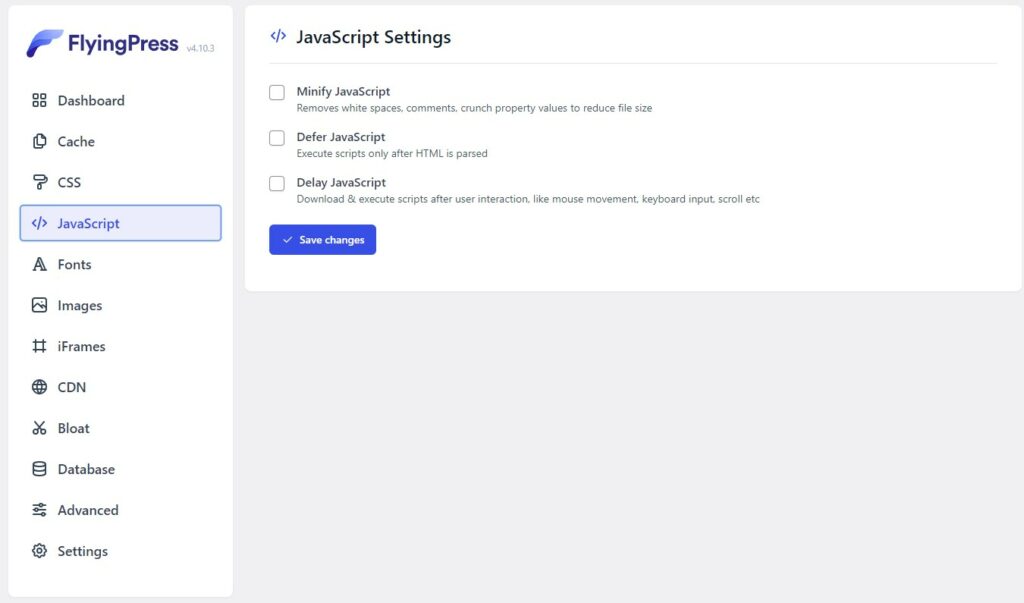
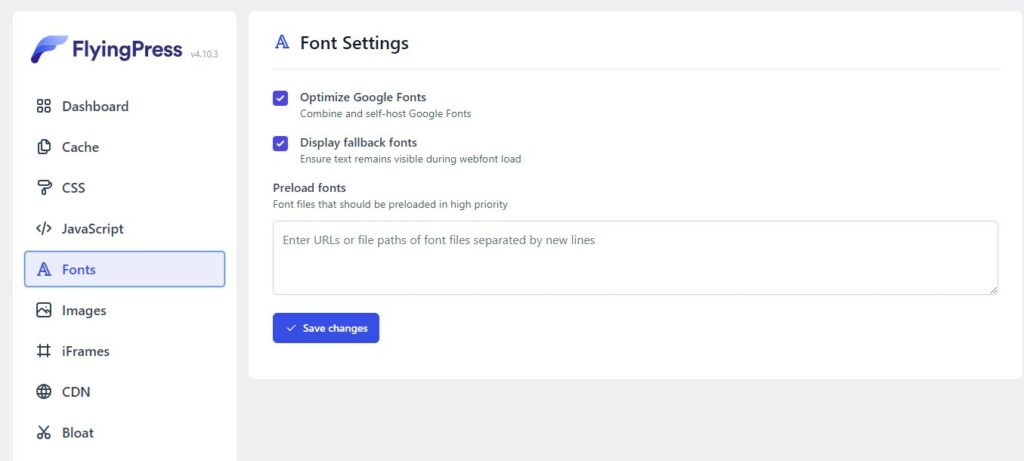
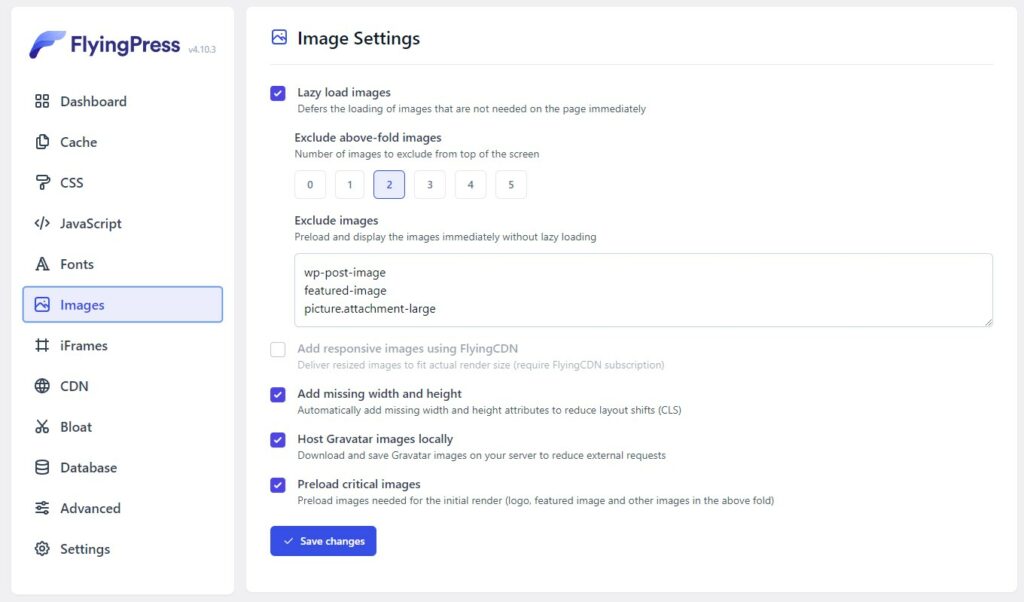

CSS / Javascript can slow down your website, so you can adjust settings here with a cache plugin. Delaying JS often works wonders.
Measure 2: Only use the plugins that are (really) necessary
And be sure to keep the plugins you use up to date. Only use the WordPress plugins that are really (and I mean really) necessary. You don't need a plugin for every little thing. Often there are plugins that offer multiple functions - only activate the ones you need. This is the case with Elementor.
Deactivate the plugins that you do not use – and do not need.
Before installing a new plugin, you should check whether it is essential to your website's functionality.
Regularly remove plugins that are no longer needed to optimize your website's performance and security.
Deactivating the plugins you don't use is enough - you don't necessarily have to delete them.
Use a quick theme 🚀

WP Astra – this template is fast, free and offers even more if you get the premium version. I now use Astra on 99% my websites – my own and those of my clients.
Astra is very fast, as you can clearly see in this comparison: https://raidboxes.io/blog/webdesign-development/fast-wordpress-themes/
You can also find other quick themes here on the link. And yes: the choice of WP theme is crucial to the speed of your website.
Poorly coded themes and plugins can send inefficient queries to your database, slowing loading speeds.
Solution: Carefully choose themes and plugins that are known for their performance and efficiency. For example Astra or GeneratePress.
Use a fast web hosting
Fast hosting is also important - if a website is hosted on a slow server, no amount of effort will help. Choose a hosting provider that offers powerful servers and a reliable infrastructure to ensure your website loads quickly.
Fast hosters include:
Strato and Host-Europe, on the other hand, are slow.
Optimize (compress) all images
There are plugins for this. Just search for them – or use the plugin that I use: Imagify

Imagify makes it possible to make images smaller. And it’s completely automatic. This means your page will load faster overall and the images will also be displayed faster.
Use of caching and content delivery networks (CDN)
Implementing caching and using content delivery networks (CDNs) are two of the most effective ways to improve the loading speed of your WordPress website. Both approaches reduce page load time by reducing the amount of data that needs to be transferred and by ensuring that content is delivered geographically closer to the visitor.
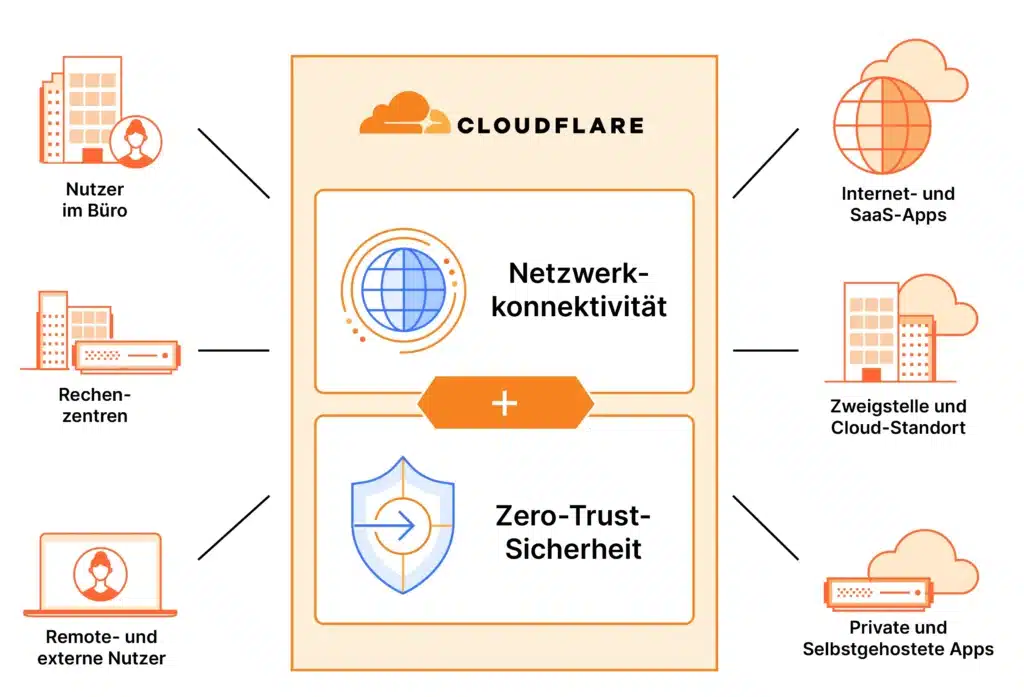
caching
Caching stores temporary copies of your pages or posts in the visitor's browser memory or on the server so that future visits can load the page faster without having to fetch the entire page from the server again.
- Page caching: Stores entire HTML pages in cache and serves them quickly without having to regenerate them each time you visit.
- Object caching: Caches data queries to reduce database load and increase speed.
Content Delivery Networks (CDN)
A CDN is a network of servers located around the world that store a copy of your website content. When a visitor visits your website, the content is delivered from the server that is geographically closest to them. This reduces the time it takes to transfer data over long distances, thus speeding up loading speeds.
- Reducing latency: Serving content from a server close to the visitor reduces the time it takes to process the request and deliver the content.
- Scaling of resources: CDNs can help handle peak loads by distributing traffic across a global network, keeping your website stable even when traffic is high.
The combination of effective caching and the use of a CDN can dramatically improve your WordPress website load times. Both Tec
Use no (or little) Javascript
Javascript can significantly slow down your website's loading time, especially if used excessively. Reduce script usage to a minimum and optimize code to improve your WordPress site's overall performance. Instead, use CSS and HTML wherever possible to achieve faster loading time.
Conclusion
A fast loading time is a crucial factor for the success of a WordPress website. By using a cache plugin, reducing unnecessary plugins, choosing a fast theme and powerful hosting, as well as optimizing images and minimizing Javascript code, the loading time of a WordPress page can be significantly improved. What does that bring? A better user experience, lower bounce rates and an overall more successful WordPress website.
So start optimizing your website for speed right now.


